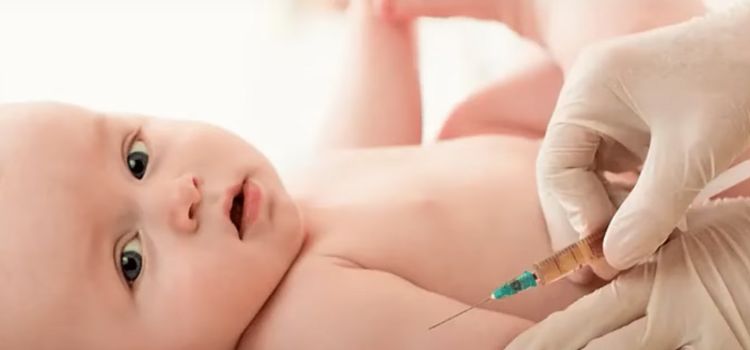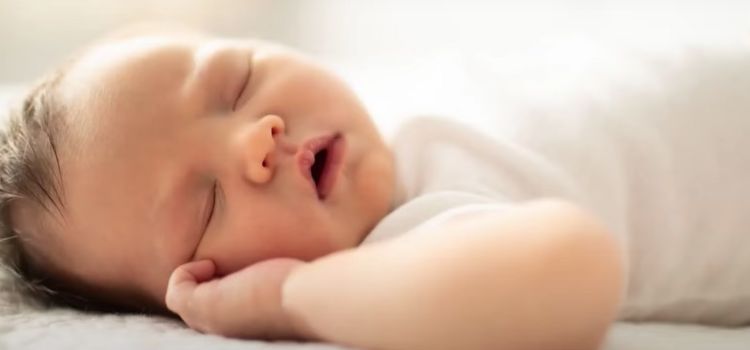As an Amazon Associate I earn from qualifying purchases.
There are always questions when it comes to parenting, particularly those that concern the health and welfare of our young children. Parents often ask about their child’s sleep patterns after vaccines. It makes sense that you would want to make sure that your kid is relaxed and comfortable at this time. In order to provide you with the knowledge you need to make the best choices for your kid, we will examine How Long Should I Let My Baby Sleep After Vaccinations following immunizations and numerous aspects that may affect your baby’s sleep following immunizations. So let’s investigate this issue and provide some clarification.

Explain the significance of sleep in promoting healing and recovery
Sleep is essential for supporting healing and recovery, which is particularly critical after vaccines. The body can enhance its immune system, repair and renew tissues, and generally improve health with enough sleep. Babies’ bodies have a reaction after vaccines, which prompts the immune system to generate antibodies. After immunizations, it’s crucial to give your kid adequate sleep so their bodies can relax and heal, which improves the efficiency of the shots. How long after vaccines should you let your infant sleep? While there is no set period of time, it is typically advised to give your baby’s sleep first priority and to give them as much time as they need to help their recovery.
Discuss the potential side effects of vaccinations and the role of sleep in managing them
In order to stop the spread of infectious illnesses and protect the general public’s health, vaccinations are essential. Nevertheless, it’s important to be aware of any possible adverse effects that might develop after having a vaccination. Making sure your infant gets adequate sleep is one method to control these negative effects. In addition to assisting the body’s recovery, enough sleep may also lessen the pain brought on by the adverse effects of vaccinations. How long after vaccines should you let your infant sleep? Although there is no set time limit, it is typically advised to let your baby sleep for as long as they need to, paying attention to their indications and creating a cozy atmosphere. You may make it easier for your child to deal with any adverse effects from their vaccinations by making sleep a priority.
General Sleep Recommendations for Babies:
Provide general guidelines for the recommended amount of sleep for babies based on their age
Depending on their age, newborns should sleep a different amount. Infants aged 3 to 11 months need between 12 to 15 hours of sleep every night, whereas newborns normally need between 14 and 17 hours. 1 to 2-year-old toddlers typically need 11 to 14 hours of sleep each night, including naps. It’s crucial to remember that these are only general recommendations and that every baby will have somewhat different sleep requirements. Additionally, following vaccines, it’s usual for newborns to undergo changes in their sleeping habits. It’s advised to give your infant as much sleep as they need to recoup and relax following vaccines.
Discuss the significance of establishing a consistent sleep routine
For everyone, even infants, developing a reliable sleep schedule is essential. How long parents should let their infant sleep following vaccines is a common concern. Sleep is crucial for newborns’ entire growth and well-being, it is necessary to remember this. It is advised to give your infant as much sleep as they need after vaccines. However, it is always advised to speak with your physician to be sure you are meeting the unique requirements of your child. By creating a regular sleep schedule, you may support good sleep habits and make sure your child receives the rest they need to thrive.
Sleep after Vaccinations: What to Expect:
Discuss expectations for sleep after vaccination
It is normal for parents to worry about their child’s sleeping habits following vaccination. It’s crucial to keep in mind that each kid may have a different reaction to immunizations and may have varied sleeping habits. Following vaccinations, some infants may exhibit moderate pain or fussiness, which may interfere with their regular sleeping patterns. After vaccines, it is advised to let your infant sleep as much as necessary so that their bodies may relax and heal. Remember that a day or two after the vaccine, you may require more sleep. However, if you have any particular worries or if your baby’s sleep habits do not return to normal after a few days, talk to your physician.
Discuss common reactions such as increased sleepiness, fussiness, or disrupted sleep
Infants often respond in specific ways after getting immunizations, such as being more sleepy, fussy, or having their sleep interrupted. As the body reacts to the vaccinations and the immune system creates a defense, several responses take place. It is crucial to remember that these responses are often brief and ought to go away in a day or two. It is advised to let your baby rest and give their body time to heal if they are becoming more sleepy. However, it is advised to speak with a healthcare provider if you have any worries or if the symptoms persist for a long time.
Duration of Sleep after Vaccinations:
Provide general recommendations for the length of sleep after vaccinations
Ensuring your kid gets adequate sleep after vaccines is crucial for their recovery and general well-being. Depending on your baby’s age and the particular immunizations they got, different amounts of sleep are advised after vaccinations. Generally speaking, it’s best to let your infant sleep longer than normal. This fosters a greater immune response while allowing their body to recover and relax. To get particular advice tailored to your baby’s requirements, you must speak with your physician. You may assist your baby in recovering peacefully after vaccines by giving them enough sleep and according to your doctor’s advice.
Indicate that every baby is different and may require varying amounts of sleep
Every infant is different and may have distinct sleeping needs, particularly after vaccines. The length of time you should let your infant sleep following vaccines is a personal decision, so keep that in mind. While some newborns may not be harmed at all, others could need longer sleep to recuperate from the possible adverse effects. For specific guidance on how to handle your baby’s sleep following vaccines, speak with your physician.
Signs to Watch for:
List signs that indicate a baby may need more sleep or be experiencing discomfort
There are many different indicators that a newborn could require extra sleep or be uncomfortable, particularly after vaccines. To determine your baby’s requirements, it’s crucial to pay attention to their behavior and indications. Excessive fussiness, increased crying, trouble sleeping or staying asleep, changes in food, and general irritability are a few typical warning signs. These symptoms might indicate that your baby needs more rest and may be in pain. Your physician should be consulted for advice on how long you should let your kid sleep following vaccines since their suggestions may change based on the particular circumstance.
Encourage parents to observe their baby’s behavior and adjust sleep accordingly
You can figure out how long your kid should sleep by just watching how they act after getting their shots. Parents must closely monitor any changes in their baby’s sleeping habits and modify their own schedule as necessary. Due to possible pain or adverse effects, some newborns may need extra sleep following vaccines. You can make sure your baby gets the sleep they need to recuperate and maintain their immune system by keeping an eye on their behavior.
Tips for Promoting Better Sleep after Vaccinations:
Offer practical strategies for encouraging quality sleep after vaccinations
For parents who may be unsure of how long they should let their infant sleep following vaccines, providing realistic suggestions for promoting decent sleep may be immensely beneficial. Infants may suffer minor pain or side effects after vaccines, such as fever or soreness at the injection site, which may interfere with their normal sleep patterns. It is advised to provide a peaceful and calming atmosphere, follow a regular sleep pattern, soothe your baby by rocking or caressing them, and keep an eye on their temperature to guarantee a comfortable night’s sleep. By using these techniques, parents may assist their infant in getting the rest they need to recuperate and maintain their health after vaccines.
Include suggestions such as creating a calm sleep environment and providing comfort measures
Baby’s post-vaccination sleep may be considerably improved by creating a tranquil sleep environment and providing soothing measures. After receiving vaccines, it’s crucial to give your kid enough time to recover. It is possible to tell when your kid is ready to wake up by watching their behavior and clues, even if there is no suggested time frame. Make sure there is little noise or other disturbance in the room where you will be sleeping. Relaxation may also be aided by dim lighting and a comfortable setting. Offering your infant comfort items like a favorite blanket or stuffed animal will help calm them and promote sleep. Remember to ask your doctor if there are any special recommendations for how long you should sleep after receiving a vaccine.
Consult a Healthcare Provider:
Emphasize the importance of consulting a healthcare provider for personalized advice
It’s crucial to get tailored guidance from a healthcare professional, particularly when it comes to the query, “How long should I let my baby sleep after vaccinations?” While it is normal for parents to worry about their baby’s health after immunization, it is vital to get advice from a healthcare practitioner. They have the knowledge to provide tailored advice based on the particular requirements and medical background of your kid. You may have peace of mind and safeguard your baby’s health and safety by visiting a healthcare professional to make sure you are adhering to the best sleep recommendations for your baby after vaccines.
Mention that healthcare professionals can provide specific recommendations based on a baby’s individual needs
A baby’s particular requirements are taken into consideration when healthcare experts make specific suggestions, like how long to let a newborn sleep following vaccines. Healthcare specialists may provide advice catered to each baby’s particular needs even if there is no universally applicable length. It is crucial to speak with your physician or other healthcare professional about any possible adverse effects of vaccines and to abide by their advice about your baby’s sleep thereafter.

Conclusion
In conclusion, a baby’s sleep time following vaccines might vary. It’s common for infants to experience fatigue and disturbed sleep following vaccines. Others may just have minor sleep problems, however, other infants may need longer naps or more frequent sleep for a day or two. It’s crucial to keep in mind that every infant is different, and their demands for sleep may vary. It is advised that you provide your infant comfort and support during this period by paying attention to his or her signals. It is always preferable to speak with your physician for specific advice if you have any worries about your baby’s sleeping habits after the vaccines.
Amazon and the Amazon logo are trademarks of Amazon.com, Inc, or its affiliates.